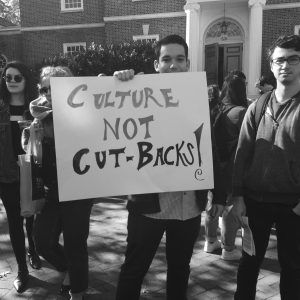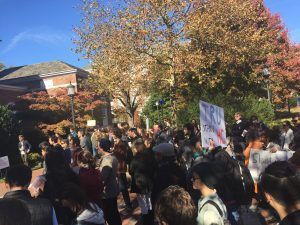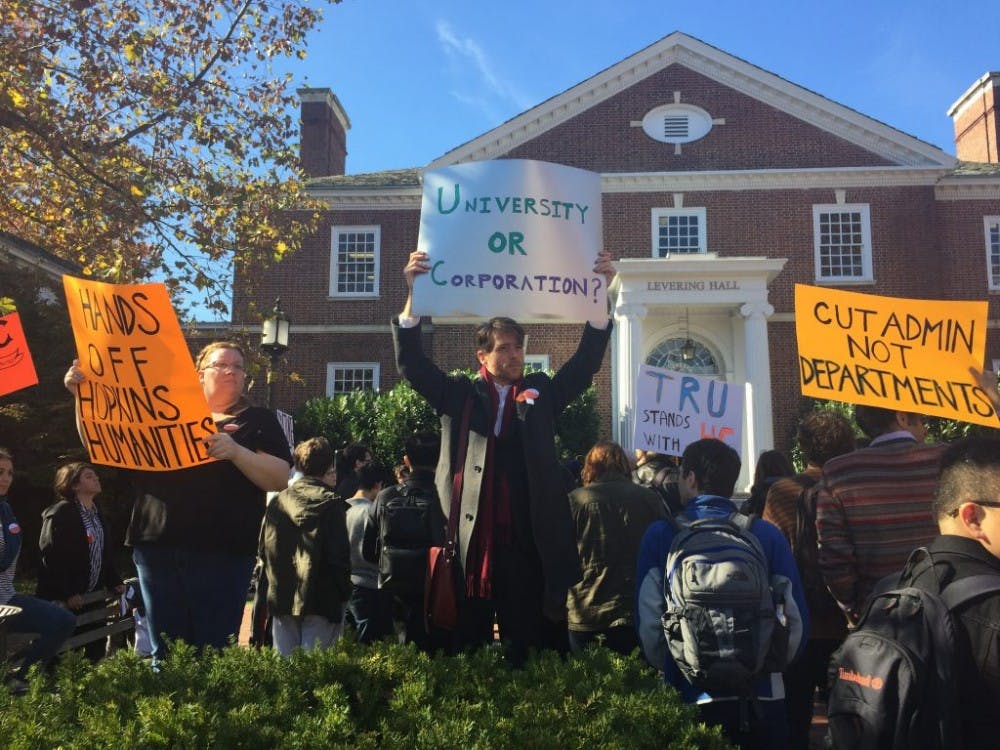Supporters of the Humanities Center (HC) gathered in the Levering Courtyard last Thursday to protest its potential closure. Graduate students and professors voiced their concerns and placed the HC demonstration in the context of other student movements around the world.
Protesters held signs with slogans that read “University or Corporation?,” “Hands off Hopkins Humanities,” and “Culture not Cut-backs.” They also handed out buttons and pamphlets detailing the history of the conflict, along with a list of their demands.
Dean of the Krieger School of Arts and Sciences (KSAS) Beverly Wendland sent out a memo in June which called for a neutral committee to review the HC. At the end of her memo she stated that the Center may be closed. However, many students critique this measure as opaque.
In the opening remarks, HC graduate student Misha Davidoff praised the Center’s unique, interdisciplinary work. He stressed that autonomy is critical to the function of the HC, and he argued that the administration has attempted to micromanage the department.
Activists who participated in other student movements were invited to speak afterwards. They shared what they learned from struggles in London, Berlin, Puerto Rico, Quebec and the University of California and how neoliberalism has spurred the commercialization of the University.

Joseph Giardini, a graduate student in the English department, said that the HC closure reflects greater trends in higher education worldwide.
“Ultimately what we see here is an attack on the humanities at Johns Hopkins, but it’s part of a movement across the world to change the ability of students to have a direct say in how their universities are run,” Giardini said.
Many demonstrators, including HC graduate student Hale Sirin, argue the University has not treated students with respect throughout the process.
“This has been an opaque procedure so far, and I think that is entirely unfair to the student body that a statement was not given to us,” Sirin said. “It wasn’t transparent, what the procedure would be like, and I think that made us even more frustrated.”
Derek Schilling, a professor in the Department of German and Romance Languages (GRLL) and the president of the Hopkins chapter of the American Association of University Professors (AAUP) backed the demonstrators.
“Even though [the HC is] not my home department, there are great synergies at this University between it and various departments, and to even see closure on the table is a shame,” he said. “Members of the AAUP will be drafting and approving a statement reflecting the views of [AAUP] and the importance of collective governance at all levels and transparency.”
He also spoke about the value the HC provides Hopkins.
Schilling said that the Humanities Center was one of the reasons he came to Hopkins after 12 years at Rutgers University, even though he would not be working directly in that department.
Senior Corey Payne, who is co-chair of the Hopkins chapter of Students for a Democratic Society (SDS), worried about the precedent a potential closure may set.
“The problem here is University overreach more than anything else,” Payne said. “If the University could overreach and shut down the Humanities Center department, what’s to say it won’t shut down the Center for Africana Studies or the department of sociology... when suddenly they’re not making as much profit as they’d like?”
Luce de Lire, a graduate student in GRLL, spoke about the role that money played in the University’s actions.
She specifically cited how undergraduates and donors are the primary sources of income for a university and not graduate students.
“There seems to be a larger tendency for the corporate university to neoliberalize the university, which causes a lot of friction and protest and that is exactly what we are seeing at the Humanities Center right now,” de Lire said. “Classically, the humanities are not producing enough... profit and money in general, which is why they are thought of as disposable.”
Senior Brandon Block believes the University’s actions stem from the view that an education in the humanities is not marketable.

“I feel like there is a troubling trend in the University administration where they don’t value the humanities or they don’t value departments and research that can’t be tangibly advertised,” he said. “I think they make their priorities very clear when they threaten things like the Humanities Center, which is universally loved at Hopkins.”
Payne spoke about how this demonstration marks the beginning of a longer movement for the HC.
“This is the first of many steps. This is going to be a semester-long, a year-long process,” he said. “The Dean has said that she is going to make her decision in December and so you’re going to see more actions building up to that. We’re not going to stand for a process that excludes the voices of students and faculty, is decided behind closed doors without transparency and with little notice.”
Sam Fossum contributed reporting.





